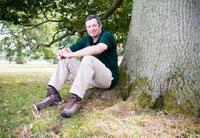2010 FW Awards: Countryside Farmer of the Year finalist – Jonathan Birchall

Jonathan Birchall started as farm manager 10 years ago at the Kings Walden Estate, Hitchin, with plans to grow bumper crops and run large heads of cattle. But the reality of the land changed his plans.
“I realised after a while on the farm we were on some very marginal land and I was frustrated with not being able to get the results I wanted. I looked back in history and realised most of this area wasn’t arable at all,” says Jon.
So he turned his attention to environmental stewardship options to improve the farm’s management and the environment.
“With the ELS and HLS I got an opportunity to improve the environment I work in, ensure the financial viability of the farm and get increased job satisfaction,” says Jon.
In his time on the farm Jon has turned more of the holdings over to stewardship up to the point where, as of this year, the farm is almost split down the middle with 392ha (970 acres) arable and 335ha (830 acres) in grassland/stewardship.
The remaining arable land has been analysed using yield mapping technology to reveal the most fertile regions, which will continue to produce crops with a variable seed rate application using a drill he has designed for the conditions.
“I think we should farm the bits that are capable of being farmed economically to the best of our ability and concentrate our environmental schemes on the areas that can’t support intensive operations,” says Jon.
Across the farm, the effects of removing so much arable land are being noticed with lapwing, corn bunting, grey partridge and turtle dove all breeding on the farm.
There are more than 10ha of unfertilised headlands, beetle banks, skylark plots, pollen and nectar mixes, wild bird seed mix, field corners and grass margins.
As well as these efforts to provide food for wildlife, 4000m of hedges have been restored to provide habitat for birds and animals.
Jon says he is aware that the time has come where farmers will be questioned over their acceptance of subsidy from the government. But he believes through data collection and achieving goals of attracting wildlife they can justify their place.
“We’re not just farming, we are selling environmental services; we are taking money for that, and we are also supplying education,” he says.
“Historically, the government subsidised you to plough up the land and now we are being subsidised to return the land to its natural state.”
Where cattle and lambs once intensively grazed there is now a herd of 150 native Longhorn cattle and a flock of 350 Wiltshire horn ewes. However, slow maturation rates have forced up costs and has led to him now crossbreeding with Aberdeen Angus, and Dorset and Chalet rams.
He has introduced a “meat box” scheme which offers meat grown on the farm for sale to local people. It has not just provided another revenue opportunity but changed attitudes towards opening the gates to the public.
“Before the meat box scheme my attitude to people coming on the farm was, ‘get off my land’, but I’ve realised everyone is a potential customer and this has led to us opening the farm more and more for public access,” says Jon.
During this year’s Open Farm Sunday the farm had over 1400 visitors, which has encouraged Jon to look at setting up a permanent farmers’ market on the farm.
Customer demand through the meat box scheme led to a boutique pig rearing operation being started on the farm with around 12 sows.
As a farm manager he will one day hand the reins back to the owner, but he still wants to leave a personal trace.
“I’ve done all this because I love the landscape and not because I’m personally getting anything from it. I like the idea the oak trees I’ve planted will still be here in 400 years’ time,” says Jon.
“I think I’m managing a more financially and environmentally sustainable farm into the future.”
Farm Facts
• 809ha (2000acre) farm
• Two-thirds of the farm is in grassland stewardship options
• Medieval parkland with 900-year-old oak trees
The judges liked
• Manages the natural environment from a commercial perspective
• Raising traditional breeds but willing to cross breed to serve the marketplace
• Has a strong community focus
• Enthusiastic and eager to learn more skills
• For more on the 2010 Farmers Weekly Awards
• For more on the the 2010 finalists
